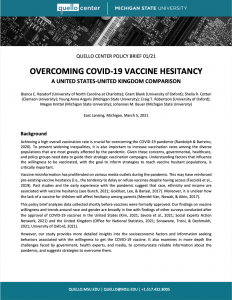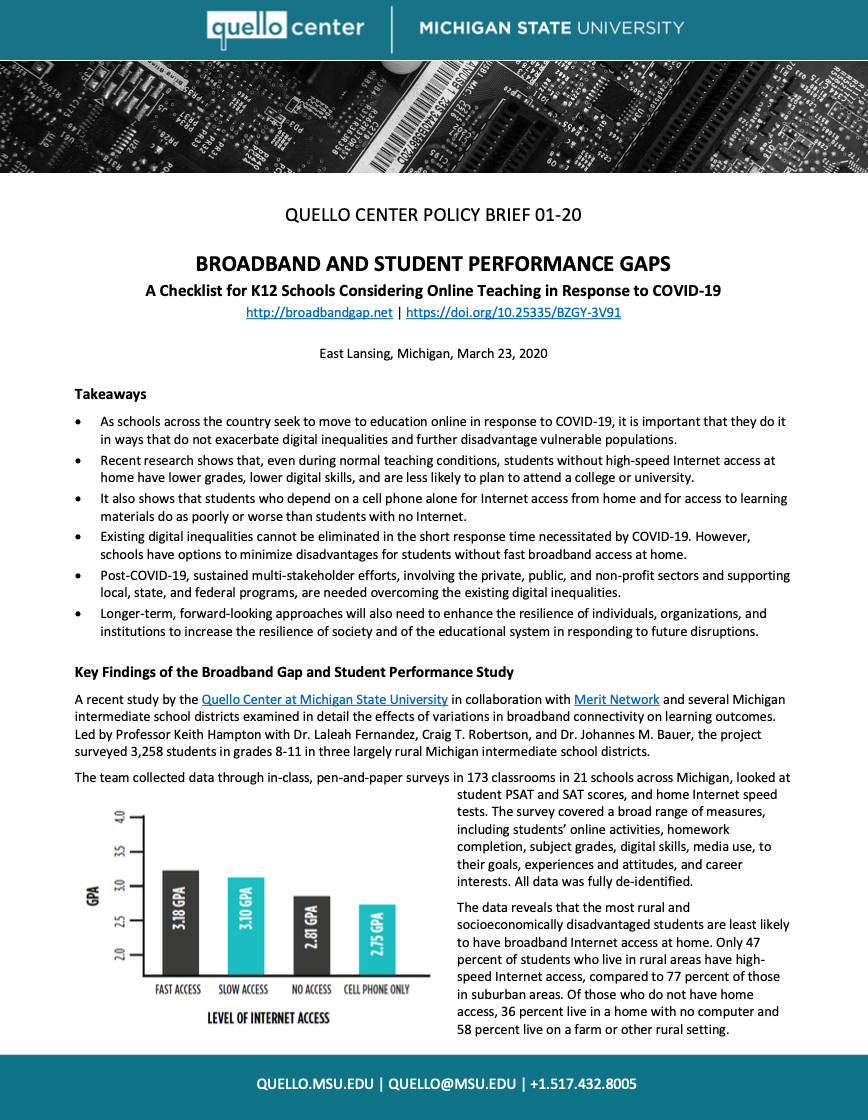Overcoming COVID-19 Vaccine Hesitancy: A United States-United Kingdom Comparison
 Achieving a high overall vaccination rate is crucial for overcoming the COVID-19 pandemic. To prevent widening inequalities, it is also important to increase vaccination rates among the diverse populations that are most gravely affected by the pandemic. Governmental, healthcare, and policy groups need data to guide their strategic vaccination campaigns. This policy brief presents insights from data collected shortly before vaccines were formally approved. Our analysis helps to understand the factors that influence the willingness to be vaccinated and informs strategies to reach vaccine hesitant populations.
Achieving a high overall vaccination rate is crucial for overcoming the COVID-19 pandemic. To prevent widening inequalities, it is also important to increase vaccination rates among the diverse populations that are most gravely affected by the pandemic. Governmental, healthcare, and policy groups need data to guide their strategic vaccination campaigns. This policy brief presents insights from data collected shortly before vaccines were formally approved. Our analysis helps to understand the factors that influence the willingness to be vaccinated and informs strategies to reach vaccine hesitant populations.
Overall, our findings on vaccine willingness and trends around race and gender are broadly in line with findings of other surveys conducted after the approval of COVID-19 vaccines in the United States and the United Kingdom. However, our study provides more detailed insights into the socioeconomic factors and information seeking behaviors associated with the willingness to get the COVID-19 vaccine. It also examines in more depth the challenges faced by government, health experts, and media, to communicate reliable information about the pandemic, and suggests strategies to overcome them.
Research Team: Bianca C. Reisdorf (University of North Carolina at Charlotte); Grant Blank (University of Oxford); Shelia R. Cotten (Clemson University); Young Anna Argyris (Michigan State University); Craig T. Robertson (University of Oxford); Megan Knittel (Michigan State University); Johannes M. Bauer (Michigan State University)
Broadband and Student Performance Gaps: A Checklist for K12 Schools Considering Online Teaching in Response to COVID-19
 School districts face difficult choices. Large scale shifts in public education to an online curriculum must consider inequalities in broadband access, devices and skills, as well as parental and caretaker involvement. However, these inequalities cannot be overcome immediately. Unless schools decide against online teaching altogether because of these concerns (a strategy that has disadvantages for connected students), they need to find responses that minimize potential disadvantages for vulnerable populations. Key considerations are (1) offering of measures to improve the capacity of teachers, parents and learners to adapt to online learning, (2) appropriate design and use of distance learning, and (3) short-term measures to improve access to broadband. Quello Center Policy Brief 01-20 lays out options for short-term and long-term responses to the crisis.
School districts face difficult choices. Large scale shifts in public education to an online curriculum must consider inequalities in broadband access, devices and skills, as well as parental and caretaker involvement. However, these inequalities cannot be overcome immediately. Unless schools decide against online teaching altogether because of these concerns (a strategy that has disadvantages for connected students), they need to find responses that minimize potential disadvantages for vulnerable populations. Key considerations are (1) offering of measures to improve the capacity of teachers, parents and learners to adapt to online learning, (2) appropriate design and use of distance learning, and (3) short-term measures to improve access to broadband. Quello Center Policy Brief 01-20 lays out options for short-term and long-term responses to the crisis.
Research Team: Keith N. Hampton, Laleah H. Fernandez, Craig T. Robertson, Johannes M. Bauer (all Michigan State University)
